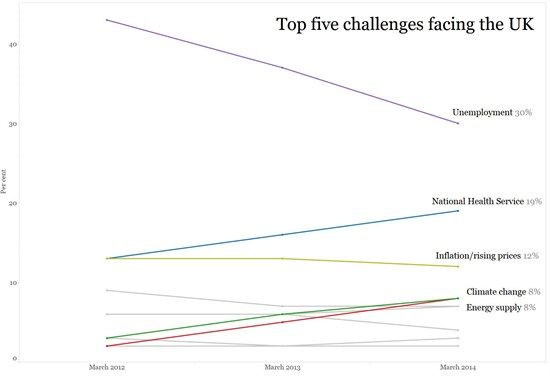Ros Donald
29.04.2014 | 3:00pmWhen you ask people whether they’re worried about climate change, they’ll probably say yes. But if you put it next to other problems like unemployment and rising prices, it’ll rank rather lower on most people’s list of priorities.
Nevertheless, new polling suggests more people now see climate change and energy supply as significant challenges for the UK.
It’s all very well asking people whether they’re worried about climate change in the abstract. It’s a bit like asking them if they’re concerned about international poverty: you’ll generally get an affirmative answer, but it might not tell you much about people’s real worries and priorities.
To get around this, pollsters can ask people how they rate the issue against other everyday concerns – like the increased hardship many have had to endure since the financial crisis hit in 2008. Put like this, you’re likely to get a much better idea of the kind of issues that will change the way people vote.
New data from the Department of Climate Change (DECC)’s public attitudes tracker survey suggests climate change and energy supply now rank joint fourth in people’s minds as the biggest challenge facing the UK. Just two years ago, energy and supply and climate change had ranked eighth and ninth on the list of 10 challenges put to respondents by the department.
So what could have caused such an apparently significant reshuffle?
It’s the economy
Polling expert Leo Barasi suggests a number of factors could be at play. First, he says, people appear to be less worried about the economy this year than they have been for a while.
“Economic issues like unemployment and rising prices remain the top challenges in people’s opinion, but concern appears to have fallen slightly. This means there’s a bit more room for other issues.”
It’s worth remembering that people’s concern about the economy may well dictate whether or not they can find room to be worried about other problems.
It’s also worth noting that climate and energy issues still rank relatively low in terms of how many people put them as the most pressing issue facing the UK.
In March 2014, most people – 30 per cent – ranked unemployment as the greatest challenge facing the country. 19 per cent ranked the National Health Service as the greatest challenge, compared to 12 per cent for inflation and rising house prices.
Meanwhile, just eight per cent each said they saw climate change and energy supply as the nation’s greatest challenge. That’s still worlds away from economic worries, as the graph below shows.
Graphic by Carbon Brief, using data from the Department of Energy and Climate Change (click to enlarge).
Events, dear boy
But following a year of devastating floods, and pretty robust debate about which energy sources will power the country in the future, it’s still fairly likely that events have driven a greater awareness of climate and energy issues.
The floods the UK experienced over Christmas and into the New Year certainly appear to have left their mark.
A YouGov poll, produced in February this year – just after the floods hit – backs this up. When asked to pick up to three of the most important issues facing the country at the time, 23 per cent counted the environment among their responses, compared to nine per cent in late January.
Looking at which challenges made the top three in the DECC polling is also instructive. 31 per cent mentioned energy supply in the top three, and 22 mentioned climate change, as opposed to 26 per cent and 17 per cent this time last year, indicating that even more people see these issues as among the greatest challenges facing the country.
Media and political debate over the UK’s energy future also appear to have questions of energy supply further up the hierarchy. The continued focus on potential new sources of energy like hydraulic fracturing for shale gas, for example, seems to be breaking through into public consciousness.
Many more people are aware of shale gas now than they were last year. 75 per cent of people said they were aware of shale gas to some degree in March 2014 – a big jump from 52 per cent this time last year. People are also much less likely to take a neutral stance on the issue – down from 48 per cent in December 2013 to 44 per cent in March 2014.
Meanwhile, support for onshore wind power has risen to a new high – 70 per cent, up from 64 per cent last year, as blog Carbon Commentary highlights.
The importance of priorities
In contrast to the the apparent rather dramatic shift in public priorities on climate and energy issues, general concern about climate change appears to have stayed fairly static – actually, much as it has done over the past three years.
In March 2014, 68 per cent of people, when asked directly, said they were very or fairly concerned about climate change, a similar proportion to March 2013 – 66 per cent, and July 2012 – 65 per cent.
The results show just how important it is to ask people not just how concerned they are about something, but to express that concern in relation to other issues. Barasi says:
“This kind of question is more interesting and important politically. For example, it gives policymakers a much better indication of the kinds of issues people might actually vote for”.
The economy remains the public’s greatest concern. But DECC’s poll suggests a combination of recent events and a slight reduction in concern about the economy could be creating greater space for political debate and action on climate change and energy.


